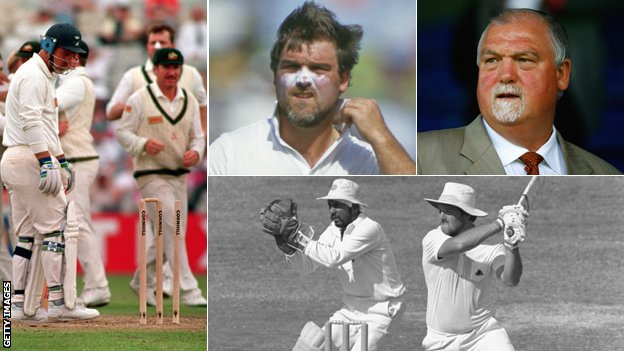The name of Mike Gatting may not be familiar in China or North America, but in much of the English-speaking world and South Asia he is remembered as a combative and hugely talented cricketer, who was involved in many of the sport’s most exciting and controversial moments between 1977 and 1995.
Gatting almost became a footballer instead; at 14, he tried out for London club Queens Park Rangers, but was told he was “too short and fat” to be a goalkeeper. Instead he joined his local county cricket club Middlesex, where he played for his whole career, and now sits on the board. He represented England in 79 Test matches (the long form of the sport, where one game can last up to five days) and 92 One Day Internationals (a shorter game, which takes a mere seven hours). From 1986-1988 he was captain of the national team.
I met him when he came to town for the second annual Mike Gatting Cricket Festival at Dulwich College Beijing (DCB). As a player he was described as “pugnacious, bold, brave and belligerent”, but in person he is courteous, modest and patient, taking time with everyone who asks for a picture or an autograph. I talked to him about his sporting career, and what he learned from it about leadership and life.

Tell us about the Mike Gatting Cricket Festival.
“It all began when I came out here with the MCC Women’s team [a touring team consisting of distinguished female cricketers]. We talked to the schools here and realized there wasn’t much cricket, so we looked at what we might do. Dulwich said we should organize a competition. On the day of the first one we weren’t sure who was going to turn up! But nine schools came.
“This year we held it in June, at the end of the school year, but next year we’ll hold it in May, or maybe September or October. We’re looking to cement the work we’ve done with Dulwich, and create regional hubs in Beijing and Shanghai.”
With all the different sports on offer, why should children take up cricket?
“Cricket teaches you important life skills: self-esteem and respect. It’s a game with history and traditions. You have the chance to be a star, but you still have to play as a team, to integrate with others, and however well you play as an individual you can still lose. You can be elated one minute, sad the next, and it’s all about how you cope with that, how it drives you to become better.”
Twenty20 [a fast-paced form of cricket in which a game takes about three hours]has been a huge success over the last decade. What does this mean for cricket in East Asia?
“I think it’s a good thing. It’s a game that children will like: it’s not long, not complicated. There’s lots of it on TV and on the internet. It encourages innovation, you need to improvise; it’s a good thinking game. When you’re facing different bowlers, or different batters, you have to work out how best to play them.”
You played in an era when cricket and cricketers were still front page news. In many countries cricket can only be seen on TV on pay-to-view channels. Is this a problem for the game’s development?
“Not at all. Many kids don’t watch TV these days! It’s not the way they view things; they’ve grown up using Skype, email, Facebook, Google, Youtube… They watch things on their own phone or iPad. TV used to be important, it’s not so much now.”
Your talent was obvious from an early age, and the selectors showed great faith in you – you played in 31 Tests before you scored your first century [100 runs scored in one innings, an important indicator of success for batsmen]. Do you think there’s too much pressure on young people these days to succeed immediately?
“I certainly took the tough way through, but it didn’t do me any harm. It’s good to see selectors being loyal. In fact one of the reasons I got that century was because David Gower [then England captain] told me he wanted me in his team, as vice-captain. He said “What number do you want to bat? I want you to bat at three, but if it doesn’t work we’ll move you down to five, and I’ll bat at three.” That helped me because I’m a very loyal person, I appreciate loyalty.
“That had a big impact on the way I captained. I never felt I was welcome, not because of individuals but because of the system. [Gatting came from a working-class background, which was unusual for an England cricket captain at the time.] I always made sure people knew they were there because I wanted them to be there. I made big efforts with the younger ones, made sure they had someone from the senior players looking after them.
“When I made my debut in Karachi Mike Brearley, who’d picked me, was injured, and he was replaced by Geoff Boycott [a notoriously blunt Yorkshireman] as captain. Boycs said to me, ‘Here Gatt, you’re lucky on two counts. One, you’re playing today, and two, if I’d been captain you wouldn’t be here [in Pakistan]at all.’”
As England captain you achieved something few have: you won the Ashes in Australia. [The Ashes is the prize for a series of five Test matches between England and Australia, held in each country alternately. Dating back to 1882, it’s the oldest international sporting rivalry in the world.] What did you learn about leadership which helped you to victory?
“I’d never toured Australia, but I played grade cricket [Australia’s top level club competition] in Sydney for three years. I knew the sort of people I needed on the tour, knew the sort of cricket we’d have to play to win. I made sure the senior people were on my side, that they knew I was open to suggestions. I told them ‘You’re going to have to help me,’ and that helped settle everybody down. Of course they needed to understand that I had to make the decisions in the end, but they had input.
“I had to get them to play the right sort of cricket, and they all did it when they needed to. Ian Botham [legendary England all-rounder] helped enormously, his contribution was enormous. He said a few words before the first Test in Brisbane [England’s warm up games had been disastrous, prompting one journalist to write that they ‘had only three things wrong with them – can’t bat, can’t bowl, can’t field’]. Beefy [Botham] said ‘There’s eleven of us, and we haven’t played well, but that’s just practice. Let’s do what we can and be the best we can.’ We didn’t drop a catch in that test match, and we went on to win the series. We won the ODI series too, and then the World Series: all three competitions on that tour.”
You captained a team with a lot of big characters. Are there fewer characters in cricket these days?
“There aren’t so many characters in the county game. Character comes with talent, so if you look at the national team, you’ve got Stokes, Anderson, Broad, Root, Cook – they’re all very different characters. Johnny Bairstow, now he’s a character, as was his father.
“What’s changed in the county game is that you used to have overseas players playing against the guys there all year round. If you had someone like Malcolm Marshall [celebrated West Indian fast bowler] for the whole summer, it raised the standard of county cricket.”
You were famously bowled by the “Ball of the Century” [Australian spinner Shane Warne delivered a ball which appeared to defy the laws of physics.] What’s the secret to playing spin?
“You have to be positive, use your bat not your pad. A lot of people try to just kick the ball away, but that’s harder now with DRS
; DRS makes them play. You have to use your feet, hit both sides of the wicket, and have a shot that will get you up the other end and rotate the strike. That’s very important against spin.”
Do you think technology like DRS has made life easier for umpires, or undermined their authority?
“I think it has taken the angst out of the game, like neutral umpires did. [Gatting was involved in an infamous row with an umpire chosen by the country hosting the game, after which the rules were changed so that umpires had to come from a neutral country.] People can say ‘I was unlucky to get out’, but now you know if you’re out or not – providing you believe it works well, of course! And decisions have only improved by one or two percent, which shows that umpires do a great job. It’s a difficult job, they’re under much more scrutiny than they used to be. But we can’t do without them.”

It seemed hard at first to reconcile the fiery, controversial competitor that I remember from my childhood, with the genial, almost avuncular man that I met at DCB. However, although Gatting was always diplomatic in his responses, a picture began to emerge during my conversation with him: of a talented and sensitive young man who experienced snobbery and prejudice at the hands of sporting organizations still in transition from the days of Empire; a man whose “belligerence” was driven by a strong sense of justice and loyalty; whose most notorious moment was triggered by a wholly justified indignation at being falsely accused of cheating.
Mike Gatting played a pivotal role in bringing cricket into the modern era. Now he is working to drive the next stage of its development, expanding interest in the game beyond its traditional heartlands. Only time will tell whether Beijing is ready for this historic, subtle, and rewarding sport.
(If you are interested in cricket coaching for your children in Beijing, please contact me via email to cricket@beijingwriters.com or via WeChat ID AndyKilleen. With sufficient interest it may be possible to get a program off the ground.)
Photos: Bob Thomas/ Getty Images, Getty Images, Karen Killeen




